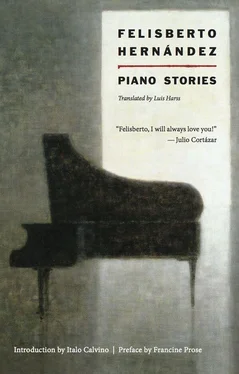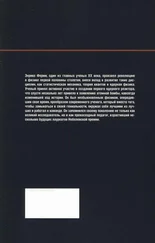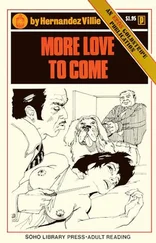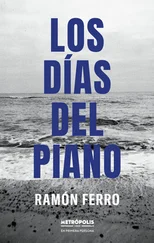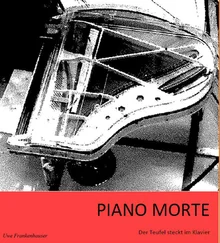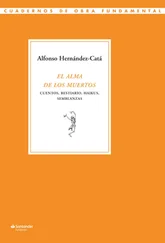Felisberto Hernandez - Piano Stories
Здесь есть возможность читать онлайн «Felisberto Hernandez - Piano Stories» весь текст электронной книги совершенно бесплатно (целиком полную версию без сокращений). В некоторых случаях можно слушать аудио, скачать через торрент в формате fb2 и присутствует краткое содержание. Год выпуска: 2014, Издательство: New Directions, Жанр: Современная проза, на английском языке. Описание произведения, (предисловие) а так же отзывы посетителей доступны на портале библиотеки ЛибКат.
- Название:Piano Stories
- Автор:
- Издательство:New Directions
- Жанр:
- Год:2014
- ISBN:нет данных
- Рейтинг книги:4 / 5. Голосов: 1
-
Избранное:Добавить в избранное
- Отзывы:
-
Ваша оценка:
- 80
- 1
- 2
- 3
- 4
- 5
Piano Stories: краткое содержание, описание и аннотация
Предлагаем к чтению аннотацию, описание, краткое содержание или предисловие (зависит от того, что написал сам автор книги «Piano Stories»). Если вы не нашли необходимую информацию о книге — напишите в комментариях, мы постараемся отыскать её.
Piano Stories
Piano Stories — читать онлайн бесплатно полную книгу (весь текст) целиком
Ниже представлен текст книги, разбитый по страницам. Система сохранения места последней прочитанной страницы, позволяет с удобством читать онлайн бесплатно книгу «Piano Stories», без необходимости каждый раз заново искать на чём Вы остановились. Поставьте закладку, и сможете в любой момент перейти на страницу, на которой закончили чтение.
Интервал:
Закладка:
My only certainty is that I can’t say how I write my stories, because each of them has a strange life of its own. But I am also aware of their constant battle against the strangers consciousness keeps urging on them.
Just Before Falling Asleep
Many times, just before falling asleep, I’ve remembered my family, as if putting an eye to a small hole and blinking to light them up in the back yard of my house. It was noon and I was returning from a town in the provinces and they had not yet seen me. They were gathered around the lunch table, under the trees, and I knew spots of light and shade fell like large coins on the tablecloth, combining each time the leaves stirred in the breeze. Engrossed in their small feast and their bit of happiness, they seemed to have forgotten me. One night the memory kept recurring, like a self-repeating mechanism: again and again they sat down at the table and seemed to have forgotten me. But suddenly the mechanism stopped and it dawned on me that those heads bent over their plates had a living image of me in their minds and carried this image around with them in a way that was probably very different from the way you carry around the image of a dead person. In any case, I had learned how my absence felt to them and what they were like when they remembered me. But I had also learned something else: that even as I opened the door soundlessly that day and watched them from behind some reeds, I was already seeing them as if I were remembering them, and I already knew the memory would follow me. And I decided that if some day I had to survive them, that was how I would remember them, some distance away and in silence. At times, when the memory has followed me and caught up with me at night, the colors of the day were like those of an ordinary postcard, but their smiles were unchanged.
The Stray Horse
I
First you saw only white: the large slipcovers on the piano and the sofa and the smaller ones on the chairs and armchairs. And underneath was the furniture, which you knew was black because of the legs sticking out from under the white skirts.
Once when I was alone in the room, I raised a chair’s skirt and found that although the wood was black the seat was a silky green.
As it often happened that neither my mother nor my grandmother accompanied me to my afternoon lesson, and as Celina — my piano teacher when I was ten years old — almost always kept me waiting, I had plenty of time to get into close touch with everything in the room. Of course, when Celina came in the furniture and I behaved as if nothing had happened.
To reach Celina’s house I had to take a last turn up a rather quiet street. There I looked forward to crossing toward some huge trees. Usually I broke off that thought to watch for traffic. Then I looked up at the trees, knowing, even before I was in their shade, what their trunks were like, rising from their big squares of earth between timidly encroaching tiles. The trunks were very thick where they began, as if they had foreseen the height they would reach and the weight they would have to bear, loaded as they were with dark leaves and big white blossoms that spread their strong scent all around because they were magnolias.
Entering Celina’s house, my eyes were full of the shapes they had gathered in the street. When they were suddenly invaded by the white and black shapes in the room, it seemed the others would fade. But as I sat down to rest — not yet daring to disturb the furniture for fear of the unexpected in a strange house — the shapes of the street lit up in me again, and it was a while before they settled down to sleep.
What never quite went to sleep was the specter of the magnolias. Although I had left behind the trees where they lived, they were with me, hidden in the back of my eyes, and suddenly I felt their presence, light as a breath somehow blown into the air by thought, scattered around the room, and blending into the furniture. Which was why, later on — in spite of the miseries I went through in that room — I never stopped seeing the faint glow of magnolias on the furniture and among the white and black shapes.
The shapes of the street had not yet fallen asleep when I began to roam — on tiptoes so Celina wouldn’t hear me — and to poke into the secrets of the room.
First I went toward a marble woman and ran my fingers over her throat. The bust was on a little table with spindly legs that rocked the first times I touched it. I held the woman by the hair with one hand while I stroked her with the other. Needless to say, the hair was not hair but marble. But the first time I steadied her that way I suddenly felt troubled and confused. For a moment she seemed so much like a real woman that I could not help thinking of the respectful behavior I owed her as a woman. That was when I suddenly felt troubled. But then I began to enjoy the sense I had of giving in to a forbidden pleasure. To me she was a mixture of the known — her suggestion of flesh and blood, the fact that she was of marble, and other minor considerations — and the unknown: the ways in which she differed from other women, her personal history (I vaguely supposed she had been brought from Europe and even more vaguely supposed what Europe might be, where she might have been bought, who might have touched her, etc.) and above all her connection with Celina. But there were a lot of other things mixed in with the pleasure of stroking her neck. I was disappointed in her eyes: the holes meant to suggest irises or pupils made them look like fish eyes. It was annoying that they hadn’t bothered to put streaks in her hair: it was a solid block of marble that made your hands cold. Where the breast began the bust ended in a cube that supported the whole figure. Also, just where the breast began, there was a flower with such sharp edges that if you moved too fast you could cut your fingers on it (and I couldn’t see why anyone would have wanted to reproduce a flower that grew wild on every fence along the road).
After looking at the woman and touching her for a while I was left only with a kind of sad memory of pieces of marble that, once explored, were no longer much like the pieces of a real woman. Yet the moment we were alone, I couldn’t keep my fingers from her throat. At times, when there were other people around — Mother and Celina engaged in some boring conversation — I even felt a certain complicity with her. Seen at a glance from across the room, her pieces formed a whole again and suddenly I was as confused as before.
In a portrait frame were two ovals with the pictures of a couple related to Celina. The woman’s head was tilted in a kindly way, but her bulging throat reminded me of a frog. Looking at her once, I don’t know why but I felt her husband’s eyes on me. No matter how I slanted my glance, he went on staring me straight in the eye. Even as I moved about the room, until I tripped over a chair, he kept his gaze fastened on me, and I was inevitably the one who had to look down. The wife expressed her kindliness not only in the tilt of her head but in all her features, even the raised hairdo and the bulging throat. Everything about her suggested a goodness and sweetness that made you think of a great big tasty dessert, no matter what part of it you tried first. And there was something about the goodness that didn’t just exist but was directed at me: I could see it in her eyes. When I worried about not being able to get my fill of her because of her watchful husband, she had a way of looking into my eyes that seemed to say, “Don’t pay any attention to him, sweetheart, I understand you.” And that set me to worrying again. I had always thought the good people who loved me best had never understood me, had never realized I betrayed them with evil thoughts. If that good woman had still been young, if she had been under the spell of that sleeping sickness in which people are alive but don’t realize when they are being touched, and if she had been alone in the room with me, I probably would have done something to embarrass us.
Читать дальшеИнтервал:
Закладка:
Похожие книги на «Piano Stories»
Представляем Вашему вниманию похожие книги на «Piano Stories» списком для выбора. Мы отобрали схожую по названию и смыслу литературу в надежде предоставить читателям больше вариантов отыскать новые, интересные, ещё непрочитанные произведения.
Обсуждение, отзывы о книге «Piano Stories» и просто собственные мнения читателей. Оставьте ваши комментарии, напишите, что Вы думаете о произведении, его смысле или главных героях. Укажите что конкретно понравилось, а что нет, и почему Вы так считаете.
